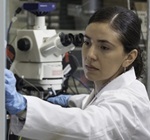Welcome to The Clinic
The final stage of research involves testing potential new drugs, interventions or approaches to care that could improve the quality of life of people with dementia. Before reaching patients, new treatments must go through clinical trials to ensure they are safe and effective.
Clinical trials for dementia are underway right now, but getting to this stage is still no guarantee of success – so we need more research, more testing, and more trials to improve the lives of people with dementia. You can be part of this progress too by taking part in research or signing up to Brains for Dementia Research to become a brain donor.



